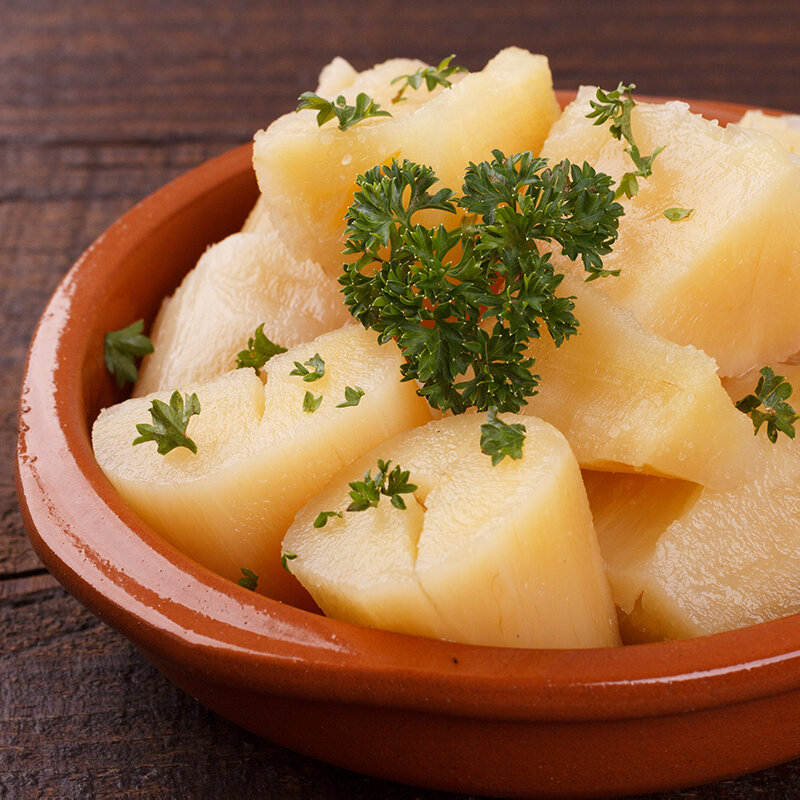6 Benefits of consuming cassava
Our first blog post couldn't be about anything else if not the source of our main ingredient. Cassava is the base for many of our gluten-free products here at Quesava. First, we need to understand that there are different final cassava product variants. Are you eating the root vegetable? Tapioca, the processed starch? The roasted flour? Or azedo, tapioca made from previously fermented cassava? The same thing works for other foods like wheat. Are you consuming whole wheat, bulgur, einkorn, or bleached white flour? The differences between these subproducts will determine how beneficial (or detrimental) they can be for your body and diet.



In this post, we’ll talk about cassava, the root vegetable, and all the benefits in its base form.
Also known as yuca, mandioca, manioc, and many more names, this vegetable is commonly featured as a main dish in many countries, or in the form of flour or starch, creating many gluten-free recipes like pão de queijo, pan de bono, pirão, yuca con mojo, amongst many. Remember to always cook cassava thoroughly. Undercooked or raw cassava roots and it's subproducts have a small concentration of cyanide, which can make you ill. Cooking thoroughly gets rid of the cyanide. According to this article, adding a little bit of oil to the water when boiling cassava will help keep the nutrients in the cassava instead of seeping out of it.
Cooked cassava has excellent nutritional value, including calcium, magnesium, phosphorus, potassium, Vitamin C, anthraquinones, saponins, and complex carbohydrates. Below are more of the benefits of eating it:
Improves Digestion
Like other complex carbohydrate-rich vegetables like yams, peas, and broccoli, the starches present in these feed the good gut bacteria, acting as a prebiotic and reducing inflammation.
Combat arthritis
The presence of saponins in the root act as anti-inflammatory and analgesic agents in our bodies; this interesting article published at Nutrients magazine elaborates on the importance of consuming saponin-present foods and how that relates to good bone health.
Immune system boost
Being a good source of vitamin C, cassava becomes a good substitute for more frequent consumption if you want or need to eat more starchy foods within the complex carbohydrate list.
Keep diabetes in check.
A person with diabetes should continuously monitor their sugar and carbohydrate intake so that the body doesn't go through high and low sugar peaks. Consuming a balanced diet rich in fiber and resistant starch makes for a gradual release of glucose into the bloodstream.
Energy for exercising
With 125 calories for every 100g, cassava is a favorite for sport practitioners. In Brazil, for example, it is common to have a classic tapioca crepe with some protein either before or after their training session. Learn how to prepare this with Beijú.
Improve your mood
All foods that promote healthy digestion and are beneficial for your gut can improve your mood. The intestines are where serotonin is produced, so maintaining a healthy intestinal flora ultimately leads to a balanced mood experience.
Despite these great benefits, moderation is still key. It is important to find a balance to fit cassava into the diet you need to follow, making adjustments to your personal preferences. If you are tired of eating sweet potatoes for your starch intake, maybe try cassava; it just tastes fantastic! It is a great gluten-free ingredient if you can't have grains and you are looking for what kind of flour to use.
Don't forget to peel cassava before cooking, and cook thoroughly until soft.


